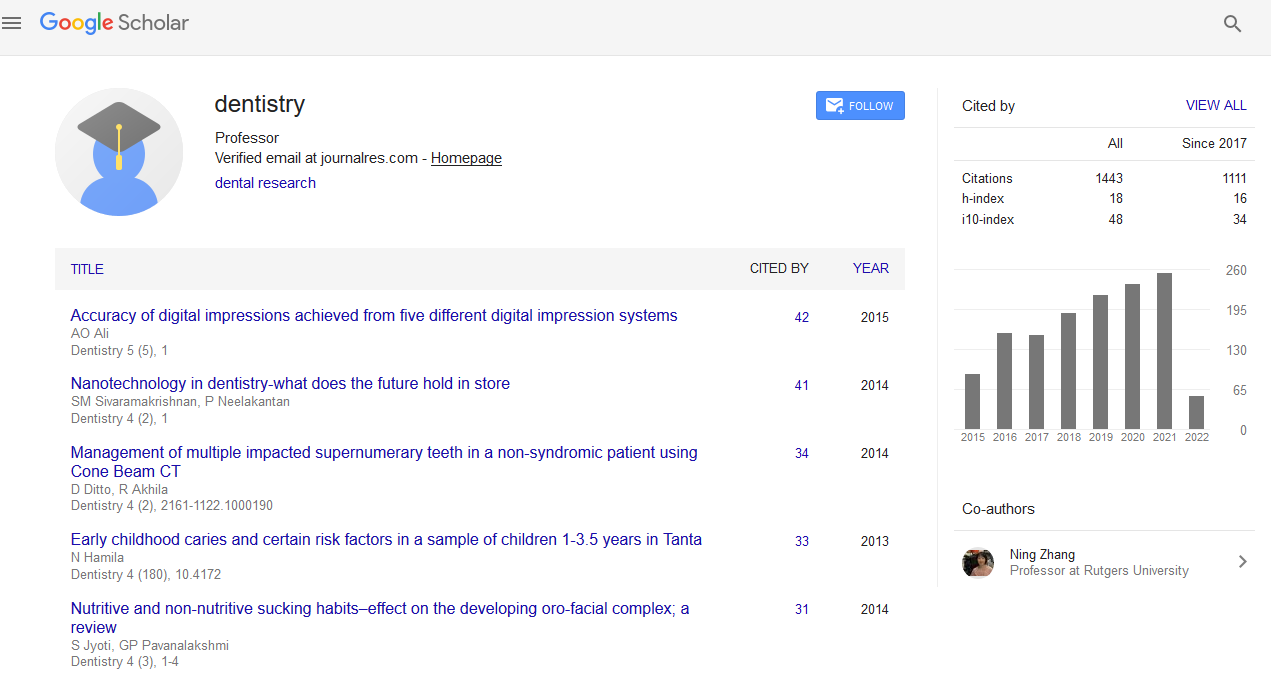Citations : 1817
Dentistry received 1817 citations as per Google Scholar report
Indexed In
- Genamics JournalSeek
- JournalTOCs
- CiteFactor
- Ulrich's Periodicals Directory
- RefSeek
- Hamdard University
- EBSCO A-Z
- Directory of Abstract Indexing for Journals
- OCLC- WorldCat
- Publons
- Geneva Foundation for Medical Education and Research
- Euro Pub
- Google Scholar
Useful Links
Share This Page
Journal Flyer

Open Access Journals
- Agri and Aquaculture
- Biochemistry
- Bioinformatics & Systems Biology
- Business & Management
- Chemistry
- Clinical Sciences
- Engineering
- Food & Nutrition
- General Science
- Genetics & Molecular Biology
- Immunology & Microbiology
- Medical Sciences
- Neuroscience & Psychology
- Nursing & Health Care
- Pharmaceutical Sciences
Abstract
A REVIEW ON GUTFLORA, BRAINGUT AXIS AND ALZHEIMER DISEASE
Prof.Simachal Panda
Alzheimer’s disease (AD) is a neurodegenerative disease in which pathophysiological changes occurs in amyloid
plaque and neurofibrillary tangles. The studies have been revealed that micro biota-gut brain axis. Gut brain has various pathways of connection. Gut and spinal cord are connected together by vagus nerve. Brain stem nuclei may require direct connectivity with brain. Enteric nervous system may stimulated by gut bacteria. Blood circulation may connect brain and gut. Probiotics are the microorganisms those give beneficial action to host body. Probiotics have the efficiency to provide substances which are beneficial for inflammation and related disease. Stress, antibiotic consumption, poor eating habits may lead to health risks due to micro flora imbalance in gut. The gut micro beta producing chemicals such as monoamine and amino acid through lymphatic and vascular system may reach to brain. Its direct link with micro biota brain guts connectivity. Gut micro beta are responsive to neurotransmitters signalled by brain. Flora has the ability to synthesize and release neuron transmitters as serotonin, dopamine and histamine. “Neuroinflammation” occurs due to neuron release substance. It is common in AD. In this context the idea developed is probiotics can reduce anti-inflammatory activity in AD by alteration in gut micro biota, which is known as dysbiosis.It can be due to gut infection, age. Healthy dietary pattern along with balanced prebiotics and probiotics decline in neurocognitive effects in AD.
Published Date: 2021-07-19;


